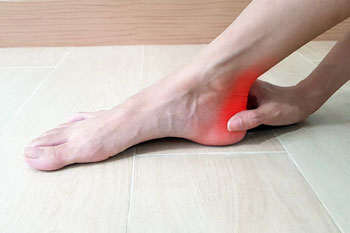
The Achilles tendon is a thick band of fibrous tissue that connects the heel bone to the calf muscles in the back of the lower leg. It is the largest and strongest tendon in the body and is responsible for helping to lift the heel off of the ground while walking, jumping, running, standing on tiptoes and climbing stairs.
Despite the Achilles tendon’s ability to withstand approximately four times a person’s body weight, it often becomes injured due to chronic strain and overuse that weakens and degenerates the tendon over time, or acute trauma.
Four Main Achilles Tendon Injuries:
Achilles tendinitis is an overuse injury causing pain, irritation, and inflammation in the tendon. If not treated properly, this condition can turn into a chronic disorder called Achilles tendinosis. Non insertional Achilles tendinitis occurs in the middle of the tendon, where fibers can degenerate and even develop tiny tears. Insertional Achilles tendinitis occurs at the site where the tendon attaches to the heel bone. This form of tendinitis may also lead to bone spurs, also known as calcified deposits, developing on the heel bone.
An Achilles rupture is a tear that occurs when the tendon is stretched too far and too quickly with an extreme movement—such as in a forceful start, a sudden stop or pivot, or a trip or fall. A complete tear may produce an audible popping noise with extreme sudden pain and an inability to walk.
Achilles tendon bursitis, also known as retrocalcaneal bursitis, is a condition caused by swelling and irritation of the retrocalcaneal bursa. This is a fluid-filled sac that provides cushioning between the heel bone and the Achilles tendon at the back of the heel.
Treatment of Achilles Tendon Injuries
Proper and immediate care is critical in treating Achilles tendon injuries to eliminate painful and sometimes debilitating symptoms, and to avoid the condition worsening and becoming more complicated over time.
Depending on the type and severity of the injury, a podiatrist may treat an Achilles tendon injury with one or more of the following methods:
Medication
RICE method - Rest/Ice/Compression/Elevation
Orthotics
Taping
Physical therapy
Casts or walking boots
Surgery in the case of a complete rupture, surgery may be necessary to repair the tendon.
Certain Achilles tendon injuries can sometimes be avoided by wearing supportive footwear, properly warming up and cooling down and resting between workouts. Also, strengthening the calf muscles, and gradually intensifying activity levels rather than doing so abruptly will help.
Schedule an appointment with your podiatrist to have your Achilles tendon pain diagnosed and treated or to learn about how to help prevent this from occurring.
